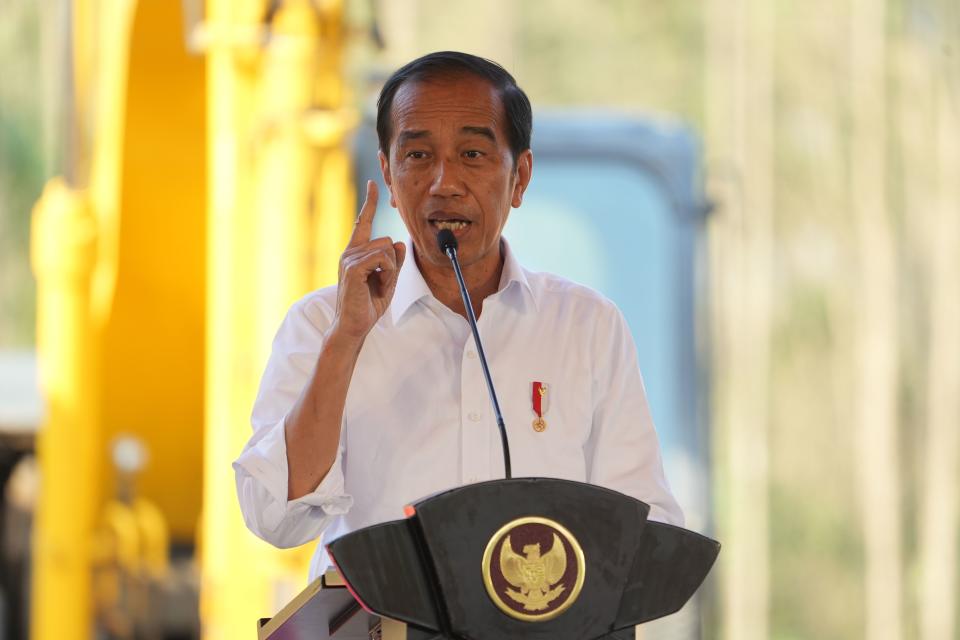Emerging-Market Star Will Be Put to Test as Jokowi’s Exit Looms
(Bloomberg) -- Indonesia’s economy, Southeast Asia’s largest and one of the region’s success stories over the past decade, faces a test of resilience as the country heads into an election next month to vote for President Joko Widodo’s successor.
Most Read from Bloomberg
China Weighs Stock Market Rescue Package Backed by $278 Billion
Apple Dials Back Car’s Self-Driving Features and Delays Launch to 2028
An Isolated Israel Doubles Down on War in Gaza — At All Costs
The world’s fourth-most populous nation has outperformed other emerging markets since it repositioned itself higher in the global supply chain, focusing on the exports of refined, rather than raw, commodities. The strategy helped support the economy, its trade balance and the currency, while borrowing costs were kept in check due to a tight lid on state budget and price pressures.
The next president will have to find a balance in a sharper rivalry between the country’s two biggest export markets, China and the US, with trade links being tested around the globe.
The leadership transition will also test whether Indonesia has built enough economic resilience to avoid sliding back into the category once known as the ‘Fragile Five’ group of countries exposed to swings in market sentiment because of their reliance on foreign investment and an economic structure weakened by cronyism and short-sighted decisions.
Some of the candidates amplify those concerns. Front-runner Prabowo Subianto represents a paternalistic tradition with Jokowi’s son as his running mate and himself a former son-in-law of the late dictator Suharto. One of his rivals, Anies Baswedan, has called to curb ties with China and to reevaluate industrial policies.
Read More: Economists Favor Jokowi Critic as Top Choice to Lead Indonesia
Ahead of the Feb. 14 election, we charted five key indicators that paint a picture of the Indonesian economy.
Trade Surplus
The shift towards higher-value exports ushered in 44 consecutive months of trade surpluses that brought in dollars to underpin the currency.
The rupiah climbed 1.1% against the dollar last year, the third-best performer among Asian currencies. The bid-ask spread in dollar-rupiah — a gauge of market volatility — averaged 6 rupiah since mid-2021 when the trade balance turned consistently positive, from the 8 rupiah average prior to the pandemic.
“The diversification of Indonesia’s export base contributed to the relative performance of the rupiah in the face of the bold US interest rate hikes, although higher commodity prices undoubtedly helped,” said Citigroup Inc. economist Helmi Arman.
Fiscal Prudence
Credit is also due to Jokowi’s economic managers, chief among them Finance Minister Sri Mulyani Indrawati who managed a tight ship even during the pandemic years that required increased government stimulus.
Indonesia managed to return the budget gap below 3% by end-2022, a year earlier than promised, and last year narrowed it to the lowest level since 2011. Tough reforms to raise value-added and excise taxes, as well cuts to fuel subsidies, replenished state coffers.
Investors will be watching whether the new leader can match Jokowi’s focus on reforms and, more importantly, his ability to execute them, Citi’s Arman said.
The next president will also need to find a way to continue the infrastructure rush spurred by state-owned builders that are now saddled with billions of dollars of troubled debt.
Lower Default Risk
Indonesia’s conservative fiscal stance has reassured credit rating agencies like S&P Global, which lifted the nation back into investment grade in 2019. S&P expects the rating to remain stable for another 12 months while Moody’s Investors Service last year said a durable increase to government revenue can be positive to the country’s rating.
Investors may already be betting on an upgrade, with one-year credit default swaps currently below its former peers in the ‘Fragile Five’ and in-line with neighboring South Korea which rating companies see as safer debt. T. Rowe Price considers Indonesian assets a haven among emerging market peers in times of volatility.
“The market has been implicitly assuming the bond rating has been upgraded for Indonesia,” said Herman Tjahjadi, chief investment officer at PT BRI Manajemen Investasi. “If you compare the budget deficit, current account and inflation between Indonesia and the BBB+ countries, you would see that Indonesian measures are already better.”
Standout Bonds
Rupiah bonds have returned an annualized 5.5% for dollar-based investors since Jokowi was elected president in July 2014, far higher than the 0.4% for a broad gauge of emerging market local-currency sovereign debt, according to data compiled by Bloomberg.
Returns may be threatened, however, should Jokowi’s successor resort to populist policies and loosen the fiscal constraints. That may see bonds and the rupiah fall, while the impact on stocks will depend on where the cash will be spent, said Vlad Byalik, an emerging markets portfolio manager at Ariel Investments LLC in New York.
Rate Moves
Indonesia has largely avoided the red-hot inflation that hit many Southeast Asian neighbors. Jokowi empowered central and regional teams to identify supply bottlenecks, shut down cartels, and even help with planting crops.
Bank Indonesia Governor Perry Warjiyo has managed to stay ahead of the curve, not averse to surprising investors with outsized and unexpected rate moves to ensure price and currency stability. Warjiyo’s reappointment through 2028 should offer some continuity.
While a 2022 law to expand the central bank’s mandate to include economic expansion raised concerns about the central bank’s autonomy, policymakers have resisted the temptation of prematurely cutting rates to spur growth. The key rate was kept at a four-year high of 6% this month, and the BI has signaled that it would be patient in easing to ensure inflation is firmly under control.
Most Read from Bloomberg Businessweek
©2024 Bloomberg L.P.








